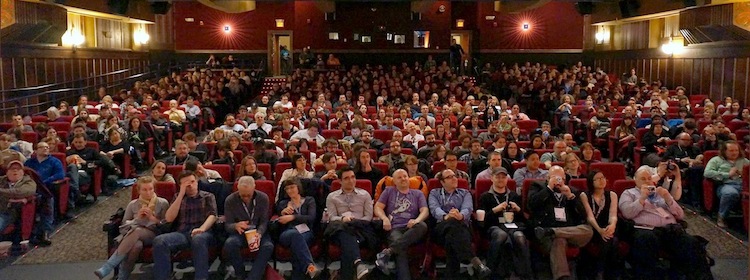Film Interview — Brian Tamm and Nancy Campbell On This Year’s IFFBoston
“We’ve let too many valuable creative people leave for Brooklyn, Austin, and Portland. We need to do something about that.”
Independent Film Festival of Boston 2015, April 22 through 29. Check the IFFB website for films and venues.

Chuck the TV and go out to the movies! A scene from the documentary “Analogue People in a Digital Age,” one of 109 films in the upcoming IFFBoston.
By Tim Jackson
According to the Internet Movie Database, 9,363 titles were released in 2014. Hollywood Reporter says that movie attendance hit an all-time low last year, despite the fact that 1.27 billion people went to the movies. Which films are drawing in the lion’s share of the shrinking audience, raking in the revenue and spinning off sequels? Blockbuster movies with international stars, elaborate computer-generated effects, or ones that are inspired by best-selling books and comics Fortunes are spent on advertising and marketing in order to create ‘must-see’ events.
Business is good for movies with state-of-the-art technology, examples of slam-bang filmmaking that dazzle eyeballs. And, miracle of miracles, there might be some Joseph Campbell-inspired, mythological zip in selected bits and pieces of the $3 billion, 12-picture Marvel Universal franchise. But there is an indispensable alternative to the corporate greed generated thrill-ride: independent films. ‘Independent’ refers less to the economics of production than it does to the fact that these films reflect unique and personal visions. Without vast marketing budgets, they rely on reviews, social media, and word-of-mouth for their success. Thus the need for the film festival.
This year’s Independent Film Festival of Boston (IFFBoson) features 109 carefully chosen films, both narrative as well as documentary features and shorts. They will screen mostly at the Somerville Theater complex in Davis Square: other locations will be the Brattle Theater in Cambridge, the Coolidge Corner Theater in Brookline, and a documentary series at UMass, Boston on Friday the 24th.
IFFBoston Executive and Programming Directors Brian Tamm and Nancy Campbell have helped manage the festival since its beginning in 2003. They have their work cut out for them. With the absence of former director Adam Roffman, who is concentrating on his career as a set designer, the job of curating, programming, fundraising, and outreach is daunting.
They began our conversation by talking about the festival as an important part of the larger Boston arts scene. They see what they do as one component of what ought to be a mutually supportive and collaborative cultural urban environment.
One key element is that the numerous universities and colleges in the area encourage students to venture off their campuses and take advantage of what is happening in the arts. In order to reach out to as wide a demographic as possible, IFFBoston recruits a diverse army of young volunteers. They keep the festival organized and lively while becoming an integral part of the festival’s theatrical experience, which includes meeting other film lovers and creators, striking up conversations, and discussing and arguing about the merits of the films. Public relations teams dictate public taste through omnipresent propaganda; at the IFFBoston, serendipity inevitably leads to unexpected discoveries: word of mouth, a post-screening party, a conversation with one of the many filmmakers in attendance. “What we are really about is creating community around film,” says Tamm, “guests bring about audience interaction. Strangers meet.” “New England can be a little reserved,” Campbell adds. “This is the season when people are just coming out of hibernation with an inclination to reach out and be social. Long term friendships develop and that’s pretty inspiring.”
In past years, filmmakers at the start of their careers have found this festival particularly rewarding. Lena Dunham (Girls), Joe Swanberg (Drinking Buddies), Alex Karpovsky (Inside Llewyn Davis, Girls) Michael Tully (blogger filmmaker, actor), Greta Gerwig (Frances Ha), Bobcat Goldthwait (this year screening Call Me Lucky, his documentary on Boston comic Barry Crimmins) have all shown early work at the IFFBoston. Tamm elaborates on this point: “We have people here who want to see the next big thing in the independent world (last year we premiered Boyhood), but also people looking for specific content about social justice or environmental issues. The festival reaches out to other organizations. We partner with the Boston Book Festival, Boston Underground, The Jewish and LGBT, and other film festivals and cultural groups.”

A stage eye’s view of the closing night of the 2014 IFFBoston at the Coolidge Corner Theatre. Photo: Judy Wong.
Boston and Cambridge have always been in the forefront of non-fiction film and IFFBoston is a favorite venue in which to premiere this kind of work. 2015 features a significant number of compelling real life stories, many created by the areas’ numerous documentarians. These include Mark Shuman’s Morphine Journey Of Dreams, Mina T. Son and Sara Newens’s Top Spin, which is about the world of competitive ping pong, and The Year We Thought About Love, a behind-the-scenes look at the Boston-based True Colors: Out Youth Theatre.
Finally, there are free panels following screenings on the weekend. Friday afternoon at UMass Boston a lineup of documentary works-in-progress will be shown as a tribute to the late Albert Maysles. This program will be followed by a panel on Video Essay. According to Northwestern University’s John Bresland, the latter has become a revolutionary literary form: “The screen of an iPad, for example, isn’t just a substitute for paper. It’s a canvas, a movie screen, an animation studio, a keyboard, a guitar, a microphone, a mixing board. The mobile devices we now use to collect our thoughts and memories don’t care whether we compose using words or images or sounds or all three.” Four of masters of this form will be present showing their work and talking about their methodology.
Tamm is passionate and eloquent when outlining his vision of seeing the Boston arts community work together: “Boston has the opportunity to be a real cultural center. We’ve let too many valuable creative people leave for Brooklyn, Austin, and Portland. We need to do something about that. There’s lot of great stuff happening here. We want to integrate with other festivals as well as show our value as one of the smaller festivals that serves a diverse and intelligent audience and is a serious showcase for developing careers in film.” “It’s Brian’s optimism that’s getting us through this year. Seriously,” Campbell chimes in. Judging from the lineup of films this year, his enthusiasm is well placed.
Full disclosure: I will hosting the panel on Video Essays at U Mass Boston on April 24th. My short film, The American Gurner, will screen in the Documentary Shorts Series F.
Tim Jackson is an assistant professor at the New England Institute of Art in the Digital Film and Video Department. His music career in Boston began in the 1970s and includes some 20 groups, many recordings, national and international tours, and contributions to film soundtracks. He studied theater and English as an undergraduate and has also has worked helter skelter as an actor and member of SAG and AFTRA since the 1980s. He has directed a trio of documentaries: Chaos and Order: Making American Theater about the American Repertory Theater, and Radical Jesters, which profiles the practices of 11 interventionist artists and agit-prop performance groups. His third documentary, When Things Go Wrong, about the Boston singer/songwriter Robin Lane, with whom he has worked for 30 years, has just been completed. He is a member of the Boston Society of Film Critics. You can read more of his work on his blog.
Tagged: Brian Tamm, IFFB, Independent Film Festival of Boston
